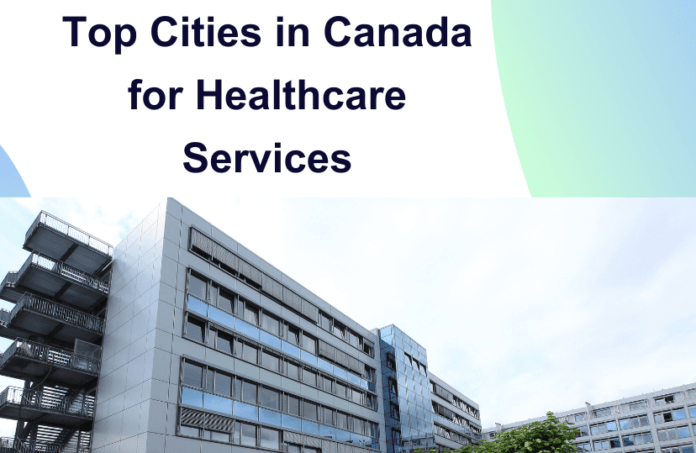People all over the world know that Canada has a strong, publicly funded healthcare system and high standards of medical care. But the quality and availability of healthcare services can vary from city to city. Some cities stand out because they have world-class hospitals, cutting-edge medical research, specialized healthcare facilities, and highly trained professionals.
If you want to move to Canada, find the best medical care for your family, or look for a job in healthcare, knowing which cities offer the best services can help you make the right choice.
Here is a detailed look at the best cities in Canada for healthcare services.
1. Toronto, Ontario
Most people consider Toronto to be Canada’s healthcare capital. The city has some of the best medical schools, hospitals, and research centers in the entire country.
Toronto’s healthcare system includes well-known hospitals such as Toronto General Hospital, Mount Sinai Hospital, and SickKids Hospital, which is internationally recognized for its pediatric care. These hospitals consistently rank among the best in the world for patient care, research, and innovation.
The city is also a leading center for specialized treatments, including cancer care, organ transplants, neurology, and cardiology. Thousands of patients travel to Toronto each year from different parts of Canada and abroad.
With world-class doctors, advanced medical technology, and plenty of employment opportunities, Toronto remains one of the top cities for high-quality medical care.
2. Vancouver, British Columbia
Vancouver is known for its strong healthcare infrastructure and exceptional patient care. The city is home to advanced hospitals such as Vancouver General Hospital, St. Paul’s Hospital, and BC Children’s Hospital.
It is also a leader in biotechnology and medical research, especially in areas like mental health, cancer treatment, infectious diseases, and precision medicine. The city’s clean air, mild climate, and focus on healthy living also contribute to better overall wellness.
Vancouver’s healthcare system emphasizes community-based services, preventive care, and mental health support. Patients consistently rate Vancouver’s hospitals highly for accessibility, innovation, and quality of care.
3. Calgary, Alberta
Calgary is one of Canada’s fastest-growing cities, and its healthcare system has expanded greatly to meet the needs of a rising population. The city is home to Foothills Medical Centre, one of the top academic hospitals in Canada.
Calgary excels in emergency care, trauma services, neuroscience, and cardiac sciences. It also offers advanced diagnostic facilities and access to specialized treatments without extremely long wait times.
Healthcare professionals in Calgary benefit from modern infrastructure, supportive workplaces, and ongoing investment in healthcare technology. Residents appreciate the city’s high-quality care, strong focus on patient safety, and well-designed health programs.
4. Montreal, Quebec
Montreal is a major hub for medical education, healthcare services, and cutting-edge research. The city has well-known institutions like the Centre Hospitalier de l’Université de Montréal (CHUM) and the McGill University Health Centre (MUHC).
These facilities provide advanced treatments in cancer care, organ transplantation, pediatrics, neurology, and genetic research. Montreal’s hospitals are also known for handling complex medical cases and providing specialty care not available in many other regions.
Because of its world-class universities, strong medical research centers, and innovation-focused healthcare system, Montreal is an excellent city for medical students and healthcare professionals.
Its bilingual environment, diverse population, and high-quality care make Montreal one of Canada’s leading cities for healthcare.
5. Ottawa, Ontario
Ottawa, the capital of Canada, offers a well-organized healthcare system supported by excellent hospitals such as The Ottawa Hospital, CHEO (Children’s Hospital of Eastern Ontario), and the Queensway Carleton Hospital.
The city is a leader in rehabilitation services, cancer treatment, neurology, and cardiovascular research. Ottawa’s healthcare network focuses heavily on patient-centered care, community health programs, and chronic disease management.
It also benefits from a highly educated workforce and strong government support for medical research and innovation. Ottawa is known for efficient healthcare delivery, shorter wait times, and high patient satisfaction.
Families and seniors particularly appreciate Ottawa’s clean environment, safety, and strong emphasis on preventive healthcare.
6. Edmonton, Alberta
Edmonton is recognized for its strong healthcare facilities and wide range of specialized services. Major institutions include the University of Alberta Hospital, Stollery Children’s Hospital, and the Mazankowski Alberta Heart Institute.
The city is especially strong in pediatrics, cardiac care, transplant surgery, and emergency medicine. Edmonton invests heavily in research through the University of Alberta, helping advance biotechnology, immunology, and treatments for chronic diseases.
With modern medical equipment and specialized care, Edmonton has become a major healthcare hub in Western Canada.
7. Winnipeg, Manitoba
Winnipeg is known for providing reliable and accessible healthcare services. The city’s major facilities include the Health Sciences Centre, Saint Boniface Hospital, and the Children’s Hospital of Winnipeg.
Winnipeg excels in infectious disease research, neonatal care, trauma services, and primary healthcare. The city has also invested in telemedicine, making it easier for people in remote or rural areas to access medical support.
Despite being smaller than other major cities, Winnipeg’s strong community health programs and skilled professionals help maintain a high-quality healthcare system.
Last Thoughts
Canada is home to one of the world’s most trusted healthcare systems, and the cities listed above offer some of the best medical services in the country. Whether it’s Toronto’s world-class hospitals, Vancouver’s innovation, Calgary’s growing healthcare network, or Montreal’s advanced research, each city provides exceptional care.
Living or working in one of these healthcare-focused cities ensures access to skilled professionals, advanced treatments, and a supportive healthcare environment.
If you’re planning to move to Canada or explore career options in healthcare, these cities offer some of the best opportunities and medical services nationwide.











